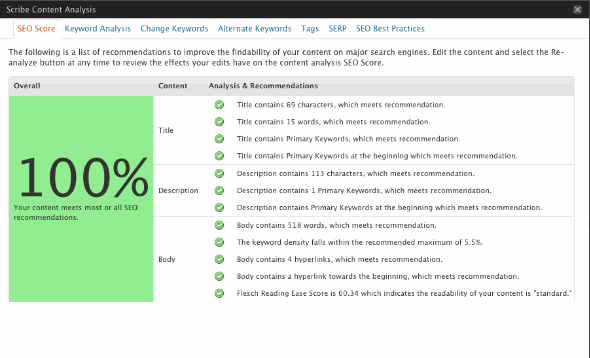Without invoking the Dos Equis guy, I don’t do a lot of SEO, but when I do, I use Scribe SEO [affiliate link] to score my blog posts to make sure I’m not missing the basics of on page optimization. It’s pretty nifty – I write my post, click the “analyze” button, and get something like this:
 And here’s a secret for you: I write, sometimes, purely for the self-esteem boost of hitting 100% on the first try.
And here’s a secret for you: I write, sometimes, purely for the self-esteem boost of hitting 100% on the first try.
Of course, it’s easy to get distracted by numbers like this, and it’s incredibly dangerous if they’re not congruent with where I want to go. In this case, it’s great that I’m at 100%, but unless I take the time to click on the keyword analysis tab and see that my primary keywords are in fact the ones I set out to target when I started – yes, by actually taking the time to visualize the outcome – then that score is going to encourage me to waste my time.
And speaking of time, for a few months this year I logged every hour of every day in a spreadsheet, and compared those numbers against estimates/targets I’d set up (more on that and the insights I gained in a later post.) I still log my time in a notebook, and I’ve been meaning to set up a practice of using the spreadsheet log one week a month so I can get a little more analysis, but I stopped using Excel for time management after I realized a) it was taking about two hours a week to do this, and b) I was finding myself filling in blocks of time because they were targeted, but not really caring if I was getting a benefit other than the joy of being “right” in my time budgeting.
These scores are guides, and there’s benefit in getting a “compliance score,” but it’s important to recognize the context that these scores have in daily life and actual goal achievement. The trick is to know when the score’s actually helpful and when they’re just a distracting yet pleasant ego boost.
Leave a Reply